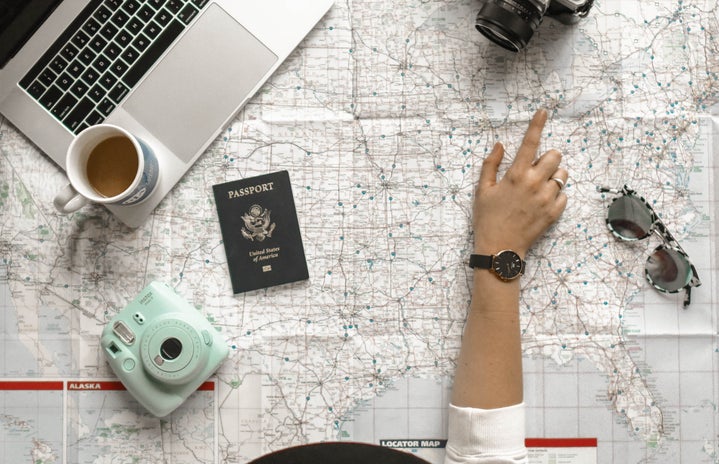One of the many perks of being a Notre Dame student is the innate opportunity of traveling abroad in a variety of countries as short as a week or as long as year. Fortunately for me, thanks to Notre Dame and their Summer Language Abroad program, I have had the pleasure of studying French in Tours, France for the past couple of weeks. Study abroad, research grants, and language grants are all possibilities, but flying out to a foreign country for the first time completely alone, and then living with a host family who knows little English can be intimidated for first-time travelers such as myself.
Again, I am by no means claiming to be an expert traveler. However, I have learned several valuable cultural differences in just the two and a half weeks I have been living here in France. It’s not easy at first, but over time the experience you gain from traveling or studying abroad is truly unlike anything else. So from a beginner’s perspective, here are a few pieces of advice any novice world traveler can learn from.
Be respectful to the country’s general dress code.
We Americans, especially those who wear parkas to class 3 months or more a year in the frozen tundra of South Bend, love to wear our cutoff, high-wasted shorts and crop tops in the summer. However, both of these things, the shorts especially, are not particularly popular in France or the rest of Europe. After speaking with some natives, I learned that tight jean shorts are a dead giveaway of an American tourist. Generally, people wear pants, even in the summertime. Instead, I have improvised by wearing sundresses and skirts (not too short, of course) to get use out of my summer wardrobe so I can save the pants for those negative-degree winter days back in Indiana. In short, when traveling abroad, pay attention to what other people are wearing because you don’t want to stick out too much in a place you aren’t yet accustomed to. Generally, American trends for college girls are obscene to most Europeans. So avoid those awkwardly long stares from old men and other unwanted attention by being respectful and mildly modifying your wardrobe when abroad.
Do heavy research on the country’s public transportation systems.
Or maybe more importantly, learn if the country ever has strikes led by their public transportation employees. In this situation, which I happened to run into with my first train from Charles de Gaulle to Tours, there’s nothing you can do but get a new ticket to a different destination and be patient. Always arrive at the train station or bus stop super early the first few times just in case something like this occurs, but don’t let the confusion scare you away! Once you successfully take the correct train, tram, or bus the first time, it might just be one of your prouder life moments, and you’ll feel more independent than ever. You might fail several times as I did, but ask for help and never get discouraged. Read as much as possible about the different forms of transportation to figure out what works best for you whether you want to plan a weekend trip to Lyon, or you just want to get to class as quickly as possible. Being confident in your ability to utilize these things will pave the way for countless adventures!
Be aware of your spending.
This sounds obvious, but be conscientious of the conversion rate in the country you are visiting. Try buying an app for a quick euro to dollar conversion to put purchases into perspective. A $29 pair of jeans sounds like a steal, but €29 is more like $40. It’s so easy to blow money on clothes, food, and drinks in Europe especially. Instead of spending on miscellaneous things you could probably buy back in the states, budget your spending to save up for weekend traveling. It will be so much more rewarding to have pictures from your spontaneous trip to Amsterdam then to waste that money on a jacket that you might wear five times before it goes out of style.
If possible, plan your stay around the country’s national holidays.
I was lucky enough to plan my six week stay any time during this summer, so of course I made sure I would be in France during Fête de la Musique on June 21st and Bastille Day on July 14th. National holidays are the best time to fully experience all the culture your country has to offer! The cities will be lively, and there will be so much to do these special days. Another perk of studying in Europe is the chance to experience the World Cup madness with countries that are a lot more serious about soccer. Watching France play in the World Cup surrounded by natives is so much fun! So, if you are debating which semester to go abroad to London or Perth, keep those national holidays in mind…even if it means missing football season. Life is rough, I know.
Just be smart.
Everyone you talk to before you leave is going to stress the importance of “being smart” in a foreign country, and these words shouldn’t be taken lightly. Leaving the Notre Dame bubble can be a bit of a culture-shock, but if you use common sense everything will work out fine. Find people to walk with you at night, go out in groups of four or more, and don’t over-do it at the bars or pubs. Not only is it expensive, but it can be tremendously dangerous if you aren’t especially cautious. Whether you like it or not, most people will be able to tell you are a foreigner, especially when you start talking (even if you think your Spanish is nearly fluent). People will take advantage of you when it comes to paying for cabs, or buying things at stands so always be weary to put your full trust in a stranger (duh, right?).
Most of all, don’t forget to have fun, take a million pictures, immerse yourself in the language and culture, and fill in your friends and family on all of your crazy adventures. The college years are some of the best for international travel; so don’t be afraid to take the plunge into the unknown. Bon voyage!
Follow HCND on Twitter and like us on Facebook!
Images: 1, 2 provided by author

